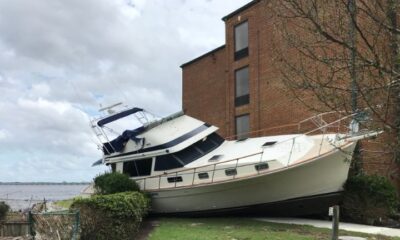NEWS
Travel-Ready French: 25 Phrases Every Tourist Should Know
Published
3 months agoon

Shutterstock
Traveling to a French-speaking country opens the door to a world rich in culture, history, and unforgettable experiences. Imagine effortlessly ordering a delicious meal at a charming café, engaging in friendly conversations with locals, or navigating bustling streets with confidence. Mastering a few essential French phrases not only bridges the language gap but also deepens your connection to the places you visit.
Speaking the local language shows respect and appreciation, often leading to warmer interactions and insider tips that you might otherwise miss. Whether you’re exploring the romantic streets of Paris or the serene landscapes of Provence, being equipped with the right words can transform your journey into a truly immersive adventure. Let’s explore 25 phrases every tourist should know.
Bonjour – Hello

Shutterstock
“Bonjour” is the quintessential French greeting used from morning until late afternoon. It’s polite and customary to greet everyone you meet with a “Bonjour,” whether you’re entering a store, starting a conversation, or meeting someone new. Using “Bonjour” not only shows respect but also sets a friendly tone for any interaction. Remember to accompany your greeting with a warm smile and appropriate eye contact to make a positive impression.
Merci – Thank You

Shutterstock
Expressing gratitude is a universal courtesy, and “Merci” is the French way to say “Thank you.” Whether someone assists you with directions, serves your meal, or holds the door open, a sincere “Merci” acknowledges their effort and kindness. For added politeness, you can say “Merci beaucoup,” which means “Thank you very much.” Using this phrase regularly will endear you to locals and enhance your overall travel experience.
S’il vous plaît – Please

Shutterstock
“S’il vous plaît” translates to “Please” and is essential for making polite requests in French. Whether you’re ordering food at a restaurant, asking for help, or seeking information, including “S’il vous plaît” shows respect and consideration. This phrase helps create positive interactions and demonstrates your willingness to engage courteously. Adjust the formality based on the situation, using “s’il te plaît” in more casual settings with acquaintances or younger people.
Excusez-moi – Excuse Me

Shutterstock
“Excusez-moi” is a versatile phrase used to get someone’s attention, apologize for minor inconveniences, or politely navigate through crowded areas. Whether you need to ask for directions, pass by someone in a tight space, or interrupt a conversation, saying “Excusez-moi” maintains politeness and respect. It’s also useful when you accidentally bump into someone or need to correct a mistake. Mastering this phrase ensures you handle social interactions gracefully.
Parlez-vous anglais? – Do You Speak English?

Shutterstock
When language barriers arise, asking “Parlez-vous anglais?” can be incredibly helpful. While many people in tourist areas speak English, not everyone does, and this phrase allows you to switch to English if necessary. It shows that you’re making an effort to communicate in French first, which is appreciated by locals. Use this phrase when you need assistance or clarification to bridge the communication gap effectively.
Je ne comprends pas – I Don’t Understand

Shutterstock
If you’re struggling to grasp what’s being said, “Je ne comprends pas” clearly communicates that you need further explanation. This honesty helps avoid misunderstandings and allows the other person to adjust their speech, perhaps by speaking more slowly or using simpler terms. It’s better to express confusion than to pretend you understand, ensuring effective communication. This phrase can be particularly useful in complex situations like navigating public transportation or understanding service menus.
Où est…? – Where is…?

Shutterstock
Whether you’re searching for the nearest metro station, a specific museum, or a cozy café, “Où est…?” is the phrase you’ll need. For example, “Où est la gare?” means “Where is the train station?” This question is fundamental for navigating unfamiliar areas and finding essential locations. Pairing it with gestures or landmarks can enhance clarity, making it easier for locals to guide you accurately.
Combien ça coûte? – How Much Does It Cost?

Shutterstock
Understanding prices is crucial to managing your budget and avoiding unexpected expenses. “Combien ça coûte?” allows you to inquire about the cost of items or services, whether you’re shopping for souvenirs or booking a guided tour. This phrase is also useful in negotiating prices in markets or with street vendors. Being informed about costs ensures you make financially sound decisions during your travels.
L’addition, s’il vous plaît – The Check, Please

Shutterstock
When you’re ready to leave a restaurant, “L’addition, s’il vous plaît” politely requests the bill from your server. This phrase streamlines the checkout process, allowing you to conclude your meal without confusion. It’s courteous to thank the staff after receiving the check, reinforcing positive interactions. Knowing this phrase helps you manage dining expenses efficiently and ensures a smooth departure from eateries.
Je voudrais… – I Would Like…

Shutterstock
“Je voudrais” is a polite way to express your desires, whether you’re ordering food, drinks, or requesting services. For instance, “Je voudrais un café” means “I would like a coffee.” This phrase is versatile and can be used in various contexts, from restaurants to shops to service counters. It clearly communicates your preferences, making it easier for others to assist you effectively.
Où sont les toilettes? – Where Are the Restrooms?

Shutterstock
Finding a restroom is a basic necessity, and “Où sont les toilettes?” is the standard way to ask for their location. This phrase is essential for maintaining comfort and convenience during your travels. It’s helpful to familiarize yourself with restroom signage as well, often marked with “WC” or “toilettes.” Knowing this phrase ensures you can address your needs promptly without hassle.
Je suis perdu(e) – I Am Lost

Shutterstock
If you find yourself disoriented, “Je suis perdu” (for males) or “Je suis perdue” (for females) clearly communicates that you need assistance. It’s important to stay calm and use this phrase to seek help from locals or authorities. Providing additional details, such as your intended destination or nearby landmarks, can aid in receiving accurate directions. Don’t hesitate to ask for help; locals are often willing to assist a lost traveler.
Pouvez-vous m’aider? – Can You Help Me?

Shutterstock
When you require assistance in various situations, “Pouvez-vous m’aider?” is the phrase to use. Whether you’re navigating public transportation, dealing with a sudden issue, or seeking recommendations, this question invites helpful responses. It’s polite and respectful, increasing the likelihood that people will assist you willingly. Pairing it with a friendly demeanor enhances the effectiveness of your request.
Je voudrais un billet pour… – I Would Like a Ticket to…

Shutterstock
Purchasing transportation tickets becomes straightforward with “Je voudrais un billet pour…” followed by your desired destination. For example, “Je voudrais un billet pour Lyon” means “I would like a ticket to Lyon.” This phrase is essential when buying tickets for trains, buses, or other forms of public transport, ensuring you get the correct route and schedule. Clear communication at ticket counters helps avoid misunderstandings and ensures a smooth journey.
Quelle heure est-il? – What Time Is It?

Shutterstock
Keeping track of time is vital for managing your itinerary and ensuring you don’t miss important appointments or transportation. “Quelle heure est-il?” allows you to inquire about the current time from locals. This phrase is especially useful when checking schedules or planning activities throughout the day. Knowing how to ask for the time helps you stay organized and punctual during your travels.
Je cherche… – I Am Looking For…

Shutterstock
Whether you’re searching for a specific shop, an accommodation, or a local attraction, “Je cherche…” followed by the desired place is the phrase to use. For example, “Je cherche un hôtel” means “I am looking for a hotel.” This expression helps others understand your needs and provide appropriate directions or recommendations. Being clear about what you’re seeking facilitates more effective assistance from locals.
Est-ce que vous acceptez les cartes de crédit? – Do You Accept Credit Cards?

Shutterstock
Before making a purchase, it’s prudent to ask “Est-ce que vous acceptez les cartes de crédit?” to confirm if credit cards are accepted at a particular establishment. This can prevent awkward situations where you may need to find alternative payment methods. It’s especially useful in smaller shops, markets, or rural areas where cash is preferred. Being prepared with this knowledge ensures smoother financial transactions during your trip.
J’ai une réservation – I Have a Reservation

Shutterstock
When checking into hotels, restaurants, or other services, “J’ai une réservation” informs the staff that you have a prior booking. Follow this statement with your name or reservation details for clarity, such as “J’ai une réservation au nom de Dupont.” This phrase streamlines the check-in process and helps avoid confusion or delays. Always have your reservation information readily available when using this phrase.
Où puis-je trouver…? – Where Can I Find…?

Shutterstock
To locate specific services, shops, or attractions, “Où puis-je trouver…?” followed by the item or place you’re seeking is highly effective. For example, “Où puis-je trouver un taxi?” means “Where can I find a taxi?” This phrase is versatile and can be used to ask for various locations, enhancing your ability to navigate different environments. Clear and specific inquiries lead to more accurate and helpful responses from locals.
Pouvez-vous répéter, s’il vous plaît? – Can You Repeat, Please?

Shutterstock
In situations where you didn’t catch what someone said, “Pouvez-vous répéter, s’il vous plaît?” politely asks them to repeat their statement. This ensures you fully understand important information without appearing inattentive. It’s especially useful in noisy environments, during complex explanations, or when dealing with unfamiliar accents. Clear communication is crucial for avoiding misunderstandings, and this phrase facilitates that effectively.
Je suis allergique à… – I Am Allergic To…

Shutterstock
Safety and health are paramount while traveling, and “Je suis allergique à…” allows you to inform others about your allergies. For instance, “Je suis allergique aux arachides” means “I am allergic to peanuts.” Use this phrase when dining out, visiting medical facilities, or engaging in activities that may expose you to allergens. Being clear and specific about your allergies helps prevent potential health risks and ensures appropriate accommodations.
Un médecin, s’il vous plaît – A Doctor, Please

Shutterstock
In the event of a medical emergency, “Un médecin, s’il vous plaît” urgently requests medical assistance. Knowing this phrase can be life-saving when you or someone else requires immediate help. It’s important to remain calm and speak clearly to ensure your request is understood quickly. Additionally, familiarize yourself with the local emergency number to complement this phrase in critical situations.
Je suis en vacances – I Am on Vacation

Shutterstock
Informing others that you’re a tourist with “Je suis en vacances” can provide context to your inquiries and interactions. This phrase helps locals understand that you might need extra assistance, patience, or information as a visitor. It fosters a friendly and approachable demeanor, making it easier to receive help or recommendations. Use it when introducing yourself or explaining your situation to enhance your interactions.
Pouvez-vous écrire cela? – Can You Write That Down?

Shutterstock
When verbal communication proves challenging, “Pouvez-vous écrire cela?” requests that someone write down information for better understanding. This can be particularly useful for addresses, directions, or important instructions. Written communication bridges language gaps and ensures you have accurate information to refer to later. Carrying a notebook or using your phone to take notes can complement this phrase effectively.
Au revoir – Goodbye

Shutterstock
Concluding interactions with “Au revoir” leaves a lasting positive impression. It’s the standard way to say goodbye in French and is appropriate in any farewell situation, whether formal or informal. Pairing it with a smile or a slight nod enhances the gesture, showing respect and appreciation for the interaction. Using “Au revoir” signifies the end of a pleasant exchange and fosters goodwill for future encounters.
Conclusion

Shutterstock
Traveling to a French-speaking country can be an enriching and unforgettable experience, especially when you can communicate with ease. By learning and using these essential French phrases, you’ll not only navigate your way through various situations more smoothly but also connect more deeply with the local culture and people. Don’t be afraid to practice and make mistakes—each attempt is a step toward greater confidence and understanding. Remember, a little effort goes a long way in creating meaningful interactions and memorable moments
More From Bon Voyaged
-


Expedia Will No Longer Sell Tickets to SeaWorld
-


Delta Unveils New Smartphone Policy During Flights
-


25 Most Devastating Hurricanes In History
-


Delta Plans to Block Middle Seats Through March 2021
-


CDC Advises Against Cruise Travel Even If You’re Vaccinated
-


Booze Now Allowed on Atlantic City Boardwalk to Help Boost…
-


Disney’s Buzz Lightyear Movie Banned in 14 Countries Over Lesbian…
-


Finally – A Moana-Themed Attraction is Coming to Disney World!
-


Dollywood Announces Star-Studded Concert Series
-


Tips For Battling The Scorching Summer Heat!
-


Mom Boards Plane, Forgets Baby at Terminal
-


Protests Force Royal Caribbean Ship to Cancel Stop in Puerto…

